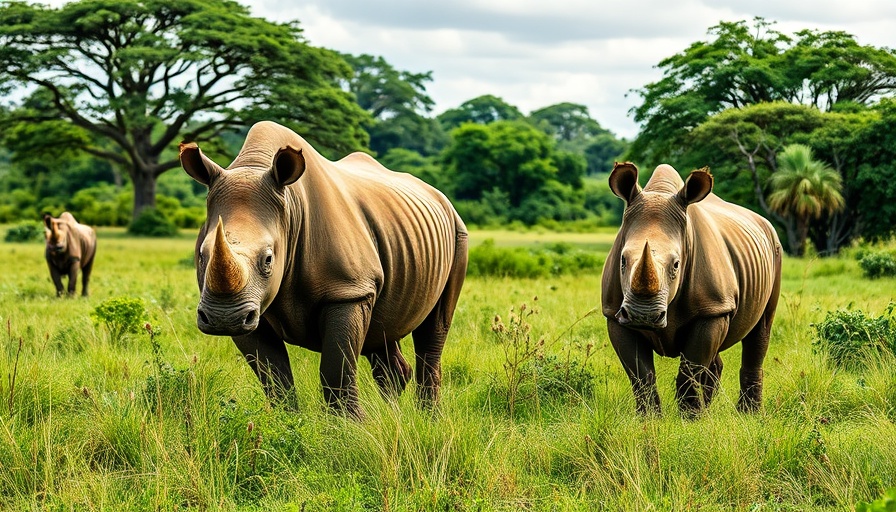
The Fight Against Rhino Poaching: A Breakthrough Strategy
In the ongoing battle to protect rhinos from the menace of poaching, a recent study reveals an intriguing solution: dehorning. Conducted across the Greater Kruger region of South Africa, this study presents a compelling case for how removing the horns of these majestic creatures can lead to a staggering 78% reduction in poaching incidents. In a world where poaching threatens not just wildlife but also human lives and entire ecosystems, these findings warrant serious consideration from conservationists and related industries.
The Research Findings: A Significant Impact
The study, which spanned from 2017 to 2023 and analyzed data from 11 nature reserves, indicated that approximately 6.5% of rhinos in the Greater Kruger area fell victim to poaching each year. Interestingly, the researchers found that 2,284 rhinos were dehorned across eight reserves, and this intervention proved remarkably effective in deterring poachers. Executing dehorning required only 1.2% of the overall rhino protection budget, making it not only effective but also economically viable.
A Closer Look: Methods of Poaching Prevention
While dehorning shows promise, the context of its findings sheds light on a broader issue. Despite a significant $74 million investment in various anti-poaching measures—including enhanced ranger training, the use of detection cameras, tracking dogs, and even helicopter patrols—the study did not find strong statistical evidence that these methods substantially decreased poaching rates. This highlights a pressing need for innovative strategies, such as dehorning, which target the incentives for poaching rather than solely increasing the risks for poachers.
The Economic Implications of Poaching
For boutique hospitality professionals, the implications of poaching extend far beyond the ecological realm. The decline of wildlife due to illegal poaching threatens not only the biodiversity of areas like the Greater Kruger parks but also the economic interests of regions depending on wildlife tourism. With rhinos being a major attraction, their decreasing population can lead to reduced tourist revenue, impacting small hotel owners and eco-lodge operators significantly. Protecting rhinoceros populations through effective measures like dehorning could thus play a crucial role in sustaining local economies.
Future Trends and Conservation Strategies
Reflecting on the study’s findings opens up conversations on broader conservation strategies. As conservationists look for solutions, there will likely be an increased focus on modifying the economics of poaching. By altering the potential profitability of poaching—rendering rhinoceroses less desirable targets through measures like dehorning—conservation efforts may witness a turn for the better. This proactive approach can inspire other initiatives aimed at managing wildlife defense systems effectively, such as exploring sustainable tourism practices or leveraging technology for wildlife monitoring.
Moving Forward: Community Involvement and Conservation Education
Education remains a cornerstone of effective wildlife conservation. Community engagement in conservation methods, including the importance of protecting species like rhinos, becomes vital. For boutique hospitality professionals, this means not only implementing **eco-conscious practices** within their businesses but also actively sharing knowledge with guests about local wildlife and conservation efforts. This engagement can help foster a sense of responsibility among visitors, encouraging them to support businesses that prioritize sustainability and biodiversity.
As the conversation surrounding wildlife conservation continues, stakeholders—ranging from conservationists and local communities to hospitality professionals—must work collaboratively toward innovative solutions. Embracing strategies that protect vulnerable species, like rhinos, will ensure a balanced ecosystem and the health of local economies.
Conclusion: Take Action for Our Planet
As professionals in the boutique hospitality sector, promoting sustainable practices is not just a duty but a shared passion. Engaging in conversations surrounding wildlife conservation and supporting effective strategies, such as rhino dehorning, is imperative. By aligning business practices with environmental stewardship, you can make a meaningful impact on protecting precious ecosystems. Join the movement, support conservation initiatives, and ensure your business remains an agent for positive change.
 Add Row
Add Row  Add
Add 




Write A Comment